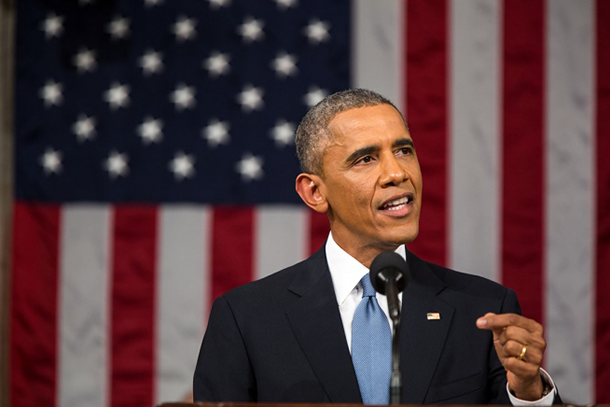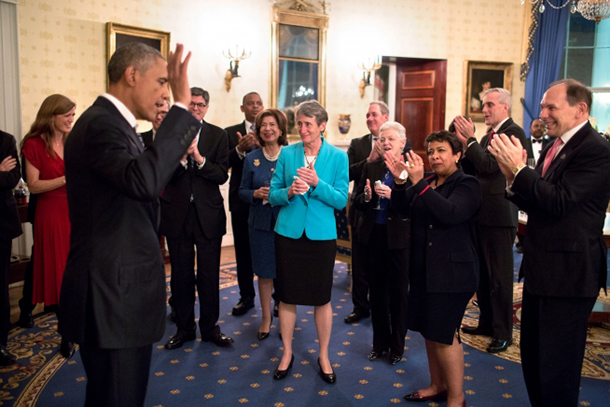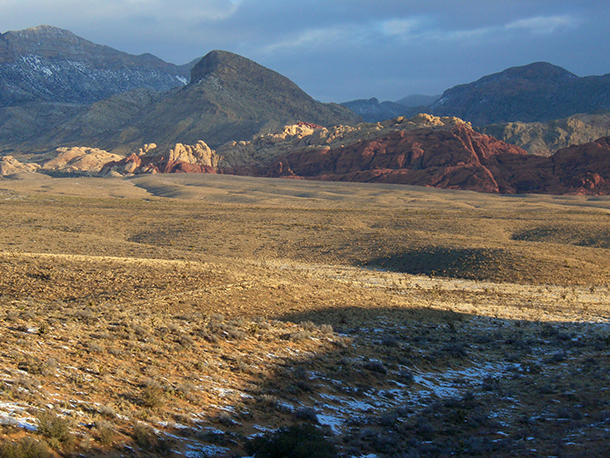President Obama and the State of the Environment
Air Date: Week of January 15, 2016

President Barack Obama delivers the State of the Union address in the House Chamber at the U.S. Capitol in Washington, D.C., Jan. 20, 2015. In previous SOTU addresses, he’s proposed cap and trade systems for carbon, but this has not come to pass. (Photo: Pete Souza, Official White House Photo)
President Obama recently delivered his final State of the Union address, outlining his vision for the last year of his Presidency and beyond. Host Steve Curwood chats with Peter Dykstra of Environmental Health News about the speech and what signals it sends about President Obama’s environmental agenda in the months ahead.
Transcript
CURWOOD: From the Jennifer and Ted Stanley studios at the University of Massachusetts Boston and PRI, this is Living on Earth. I’m Steve Curwood. In just about a year, America will inaugurate a new president, and on the eve of the first caucuses and primary elections, candidates are furiously battling for votes. Coming up, we’ll check what the Republican field has to say about the environment, especially climate change. But first, let’s take a look at some of the green legacy that outgoing President Barack Obama hopes to leave, and to do that I’m joined now by Peter Dykstra. Peter used to run the environment desk at CNN and now reports and edits for Environmental Health News and the DailyClimate.org. He usually talks with us about what’s going on beyond the headlines, but today he’s here to talk about Mr. Obama’s last State of the Union address that the President delivered on January 12. Hi there, Peter.
DYKSTRA: Well, hi, Steve. You know, over the years I’ve listened to a lot of State of the Union messages from lot of different Presidents, and any mention of energy and the environment is usually shoved to the back of the speech in the middle of a long list of platitudes about other things. But President Obama got into climate change fairly early, and fairly often.
OBAMA: Sixty years ago, when the Russians beat us into space, we didn’t deny Sputnik was up there. We didn’t argue about the science, or shrink our research and development budget. We built a space program almost overnight, and 12 years later, we were walking on the moon. [APPLAUSE] That spirit of discovery is in our DNA.
STEVE: OK, Peter, there was a bunch of big-picture stuff, what did you make of the specifics that were in this address?
DYKSTRA: There’s a couple of things, in addition to the sweeping call for clean energy growth, he made a reference to oil and gas leases on public lands.

President Barack Obama acknowledges applause from Cabinet members during a reception in the Blue Room of the White House after his State of the Union address at the U.S. Capitol in Washington, D.C., Jan. 12, 2016. (Photo: Pete Souza, Official White House Photo)
OBAMA: Now we’ve got to accelerate the transition away from old dirtier energy sources. Rather than subsidize the past, we should invest in the future, especially in communities that rely on fossil fuels. We do them no favor when we don't show them where the trends are going. That’s why I’m going to push to change the way we manage our oil and coal resources, so that they better reflect the costs they impose on taxpayers and our planet. And that way, we put money back into those communities and put tens of thousands of Americans to work building a 21st century transportation system.
DYKSTRA: Now the President’s referring to oil and gas and coal leases on public lands, and that's a problem to a lot of people on two fronts. Number one, it causes a lot of environmental damage. But also it causes a lot of income loss — those oil and gas and coal leases on public lands are virtually given away.
CURWOOD: And environmental campaigners are also talking about keeping fossil fuels in the ground on federal lands. Now the President has used that language before — didn’t use it in this particular address, but they’re hoping that that was a nod to that. So, Peter, you were keeping some score of the applause lines, what scored most on energy and the environment?
DYKSTRA: Well, that Sputnik line about climate denial got one of the biggest cheers of the night. And his mention that America “cut carbon pollution more than any other nation on Earth” drew half a standing ovation.
CURWOOD: Well, that would be from his own party, I think.
DYKSTRA: Right.
CURWOOD: And he came back at the Republicans again on climate change denial.
OBAMA: Look, if anybody still wants to dispute the science around climate change, have at it. You’ll be pretty lonely, because you’ll be debating our military, most of America’s business leaders, the majority of the American people, almost the entire scientific community, and 200 nations around the world who agree it’s a problem and intend to solve it. [APPLAUSE]
But even if the planet wasn’t at stake, even if 2014 wasn’t the warmest year on record, until 2015 turned out even hotter, why would we want to pass up the chance for American businesses to produce and sell the energy of the future?
Seven years ago, we made the single biggest investment in clean energy in our history. Here are the results. In fields from Iowa to Texas, wind power is now cheaper than dirtier, conventional power. On rooftops from Arizona to New York, solar is saving Americans tens of millions of dollars a year on their energy bills, and employs more Americans than coal in jobs that pay better than average. We’re taking steps to give homeowners the freedom to generate and store their own energy, something by the way that environmentalists and Tea Partiers have teamed up to support. Meanwhile, we’ve cut our imports of foreign oil by nearly 60 percent, and cut carbon pollution more than any other country on Earth. [APPLAUSE] Gas under $2 bucks a gallon ain’t bad, either. [CHEERS]
DYKSTRA: You know, he sort of also took a bit of a victory lap with a gloat about $2 gasoline prices, which around my house, are actually a $1.72 right now.
CURWOOD: Hey, Peter, now you’re gloating, but the President shouldn’t really take full credit for those low prices, or for that matter get blamed when they’re high, right?
DYKSTRA: Yeah, the President of the United States doesn’t necessarily have control over global oil prices. But that line was a little payback for past Republican State of the Union responses where President Obama got blamed for higher prices. That happened in the 2010 response and again in 2014. But what Obama did is posed energy as a business challenge. And he did that in one other area as well. He used the space race analogy for another related issue, the fight to cure cancer, which he put Joe Biden in charge of.
OBAMA: Last year, Vice President Biden said that with a new moonshot, America can cure cancer. Last month, he worked with this Congress to give scientists at the National Institutes of Health the strongest resources they’ve had in over a decade.
[APPLAUSE, CHEERS]
So tonight, I’m announcing a new national effort to get it done. And because he’s gone to the mat for all of us, on so many issues over the past 40 years, I’m putting Joe in charge of Mission Control. [CHEERS]
CURWOOD: There’s one thing he didn’t mention in the connection with fighting against cancer — I mean, calling for a cure is one thing but he didn’t mention cancer risk from the environment. What’s the saying, an ounce of prevention is worth a pound of cure? Some 20 percent of cancers are linked to chemical exposure. Peter, what else didn’t the President mention in your view?
DYKSTRA: Well, there wasn’t a word about any non-climate or energy environmental issue; he could have mentioned, for example, that it’s the 100th anniversary of the National Parks system, something for everybody to be proud of. He barely touched on how many jobs are being created in clean energy — that could be something to gloat over! And not surprisingly, he didn’t rub the Republicans’ faces in the Keystone pipeline rejection, or rub his own face in previous State of the Union promises to introduce a cap-and-trade system for carbon.
CURWOOD: By the way, Peter, what did you make of the Republican response to the State of the Union, from South Carolina Governor Nicki Haley?
DYKSTRA: Governor Haley didn’t touch on any climate or environment or energy issues. Maybe that’s significant, because there’s been so much denial at the top of the Republican Party these days, and certainly among the presidential candidates; maybe it’s significant that she didn’t mention it. But I want to talk a little bit about a few other past State of the Union messages.
CURWOOD: Okay.
DYKSTRA: This month is the 10th Anniversary of George W. Bush looking the nation in the eye and announcing that we are addicted to oil. What’s happened since then? Imports dramatically down, SUV sales up this year with all that cheap gas, and bottom line is we’re still addicted. And here’s one of my favorite numbers: DOE says we drove just over one trillion passenger miles in the US in the year 1971; in recent years, that’s topped three trillion miles a year – that’s 342 million miles every hour, almost all of it on petroleum and a little bit of ethanol.
CURWOOD: Whoa. What else?
DYKSTRA: Obama focused a lot on the lack of bipartisanship on every issue, but two past presidents – both Republicans — focused on partisanship in the environment. In 1970, Richard Nixon said, "Restoring nature to its natural state is a cause beyond party and beyond factions." And then he went on a five-minute tear on protecting the environment that hasn’t been repeated since by any president, including Obama. And then there’s this one, from 1984 and President Ronald Reagan:
REAGAN: Preservation of our environment is not a liberal or conservative challenge, it’s common sense.

President Obama suggested rethinking how we manage fossil fuel reserves on federal lands. (Photo: Bureau of Land Management, CC BY 2.0)
CURWOOD: Good luck with that one in 2016, Peter.
DYKSTRA: Well, yeah, and here’s a couple of other numbers from history that kind of show how bad the partisanship has gotten on environment. The League of Conservation Voters for decades has put together a voter scorecard — judging who’s done a good job by their standards and who’s done a bad job on voting on the environment. Back in the
’80s, Democratic Congressmen and Senators generally averaged around 50 percent, Republicans around 30 percent. That’s a 20 percent gap, which is a big deal. But now it’s not a 20 percent gap: it’s more like an 80 percent gap, with Democrats scoring about 90 percent from the League of Conservation Voters, and Republicans scoring about 10 percent. And here’s one specific number that I think is really telling and maybe a little weird: in the 1980 League of Conservation Voters Congressional scorecard, there was a young Georgia Congressman named Newt Gingrich who scored 50 percent, and there was a young Tennessee Congressman named Al Gore who scored 35 percent.
CURWOOD: Huh? Why did Al Gore have such a low score?
DYKSTRA: It probably had a lot to do with the fact that there were energy issues involving the Tennessee Valley Authority in areas around his district. But Newt Gingrich had a higher voting score on the environment than Al Gore did in 1980.
CURWOOD: Thanks, Peter! Peter Dykstra is with Environmental Health News — that’s EHN.org — and the DailyClimate.org. And there’s more on this story at our website, LOE.org. Thanks, Peter, talk to you soon.
DYKSTRA: Thank you Steve, we’ll talk to you soon.
Since we recorded this segment, the Obama Administration and the Department of the Interior have halted new coal leases on public lands pending further review. Below are links to the US Department of Interior documents about the order and the government's information about current coal operations.
US DOI's "FACT SHEET: MODERNIZING THE FEDERAL COAL PROGRAM"
Additional information about coal operations and leasing on public lands
Links
Watch President Obama's final State of the Union speech
The Guardian: State of the Union: no let-up for Barack Obama's climate agenda
League of Conservation Voters: Champs in Congress Support Climate Action
Reagan’s State of the Union comment on environment
Poll Finds Fewer Americans Than Ever Doubt Climate Change Is Happening
Living on Earth wants to hear from you!
Living on Earth
62 Calef Highway, Suite 212
Lee, NH 03861
Telephone: 617-287-4121
E-mail: comments@loe.org
Newsletter [Click here]
Donate to Living on Earth!
Living on Earth is an independent media program and relies entirely on contributions from listeners and institutions supporting public service. Please donate now to preserve an independent environmental voice.
NewsletterLiving on Earth offers a weekly delivery of the show's rundown to your mailbox. Sign up for our newsletter today!
 Sailors For The Sea: Be the change you want to sea.
Sailors For The Sea: Be the change you want to sea.
 The Grantham Foundation for the Protection of the Environment: Committed to protecting and improving the health of the global environment.
The Grantham Foundation for the Protection of the Environment: Committed to protecting and improving the health of the global environment.
 Contribute to Living on Earth and receive, as our gift to you, an archival print of one of Mark Seth Lender's extraordinary wildlife photographs. Follow the link to see Mark's current collection of photographs.
Contribute to Living on Earth and receive, as our gift to you, an archival print of one of Mark Seth Lender's extraordinary wildlife photographs. Follow the link to see Mark's current collection of photographs.
 Buy a signed copy of Mark Seth Lender's book Smeagull the Seagull & support Living on Earth
Buy a signed copy of Mark Seth Lender's book Smeagull the Seagull & support Living on Earth

